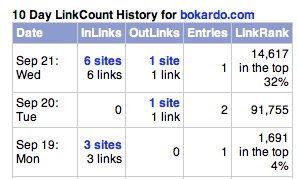September 30th
3 Great Web 2.0 Sites
In case you haven’t noticed, there’s a lot going on in the Web 2.0 development world these days. A few masochistic folks have even been trying to document a good part of it. I’m in awe of them:
- TechCrunch (Michael Arrington & Keith Teare)
“TechCrunch is a weblog dedicated to obsessively profiling and reviewing every newly launched web 2.0 business, product and service.” - eHub (Emily Chang)
“eHub is a constantly updated list of web applications, services, resources, blogs or sites with a focus on next generation web (web 2.0), social software, blogging, Ajax, Ruby on Rails, location mapping, open source, folksonomy, design and digital media sharing.”
Seriously, these two sites are great for finding out what apps are on the bleeding edge of Web 2.0. I just hope the site creators don’t burn out, because they’re doing great work that’s really helpful if you have the jones for information overload.
:)
Add these two sites with tech.memeorandum, which I profiled in-depth the other day, and you’ve got yourself three fantastic aggregation services. That’s what its all about…
